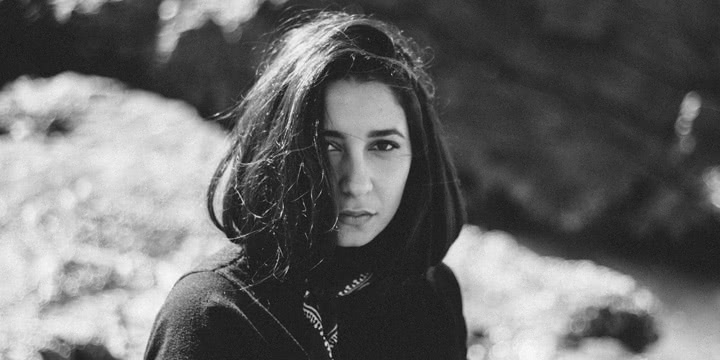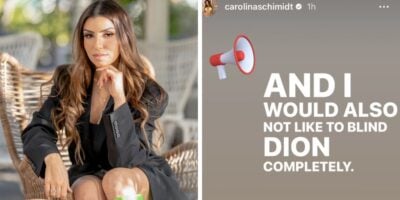Afew years ago, Wafia Al-Rikabi – or just Wafia as she normally goes – was releasing YouTube videos of herself covering songs.
Now her own songs are reaching multimillion-level viewership, and the otherwise introverted and unassuming singer/producer has found herself in the midst of an international career in music.
It’s 9am and Al-Rikabi is still slowly getting ready for the day as she stops to chat with the BRAG. Most of her songwriting is done at night, so she’s tried to structure her days to allow herself time to create music.
“I realised my writing comes in waves. I just have to allow myself to be present for it,” she says. “Sometimes I’ll be out and have no means to write a song but I’ll have an idea, so I’ll just type something into my notes or hum something into my voice memos.”
Al-Rikabi says she often finds herself in these songwriting frenzies when coming back from a tour. This year, she’s travelled alongside Perth producer and collaborator Ta-ku through Europe, Asia and New York, promoting her new EP, (M)edian. Upon her return, she found herself inspired to complete more work.
“I’ve noticed that I really like synths that are really polyphonic and have a lot of layers to them,” she says. “I really like distortion as well. I’m really drawn to the idea of taking something masculine and making it feminine. Like maybe taking a hip hop beat and adding a really pretty synth line to it.
“I also think you can’t go past a great piano. That’s how all my songs start. It’s really important to my songwriting. I think, at the end of the day, I want to be able to strip away all the production and still have my song sound like a song. I’m playing a gig in Sydney and that’s really exciting because I get to just play piano and show people the songs as they came to be.”
While Al-Rikabi likes to retain a large amount of creative oversight on her projects, she worked closely with Ta-ku for (M)edian. It’s a working relationship that started by accident, with the pair meeting while both were in Melbourne.
“We actually met on some basketball courts by complete chance and I didn’t think anything of it. But then he hit me up on Twitter looking to work together. He sent me a bunch of demos – like a whole Dropbox folder full of them – but nothing originated from that. I think I tried but I wasn’t really inspired by what was in there. He seemed to appreciate my honesty.So nothing happened but we kind of stayed in touch here and there.
“But then he hit me up last year with a cover of ‘American Girl’, asking me if I wanted to sing on it. I felt pretty comfortable with him by that point, so I sent him ‘Heartburn’ to produce out and he killed it. After that I realised we had something really special, so I flew to Perth and we sat in the studio for a few days and mowed out the EP. Circumstance brought us together and we both went through kind of similar things with our families, which became what the EP was about. He’s like a big brother to me now.”
Al-Rikabi says she finds it difficult to work with people on a purely professional level – she has to know them personally before she can trust them with her music. It’s this close-knit interaction that really defines her music career.
“I don’t think I’ve ever been the networking type. Sometimes I wish I could be the sort of person who just introduces themselves and what they do, but I have trouble even telling strangers what I do. My music’s such a personal thing for me. I guess the only reason I share my music is to enable me to continue to make it.”
Wafia is also signed to the Australian record label, Future Classic, alongside Ta-ku and other prestigious names like Flume and Nick Murphy (formerly Chet Faker). Her management, however, is based overseas.
“It took me a really long time to find management. I kind of like that I can be a little removed from the Australian music industry. I haven’t had very many positive experiences with it, if I’m being honest. There are many great people, don’t get me wrong, but on the whole I just never really felt a part of it. I’m kind of OK with a little bit of isolation.”
Al-Rikabi says her future plans mostly involve her creating more music and building her career, with an ambition to keep travelling. She says she prefers to write EPs rather than singles, always aiming for a collected work based on a particular mood or impression she wants to make. In terms of genre, she sees her music as a strange amalgam of everything she listens to.
“I listen to a lot of hip hop and rap, so I’m really influenced by that. I love Brian Eno – I’d seriously die if I ever got to collaborate with him. There’s also a lot of Middle Eastern music. I also seriously love pop music. I listen to a lot of Ariana Grande and I like what producers like Benny Blanco do. I love that accessibility; people can listen to a song and identify with it. It brings people together. Pop music’s a really great vessel.”
[Wafia photo by Claire Wakeford]
(M)edian isout now through Future Classic; andWafia performs at St. Stephen’s Uniting Church, as part of Sydney Festival 2017 on Friday January 27.


































